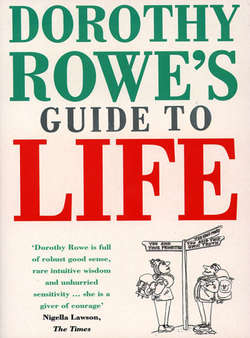Читать книгу Dorothy Rowe’s Guide to Life - Paula Nicolson, Dorothy Rowe, Dorothy Rowe - Страница 8
A PARADOX OF LIFE
ОглавлениеEven though we can never know reality directly, to survive and flourish we must always strive to make interpretations that are as close to reality as possible.
For instance, suppose you’re about to cross a busy road. You can’t possibly know the exact speed of approaching traffic, but to cross the road safely you must judge the speed of the traffic as accurately as possible. How do you make this judgement?
Suppose a friend who is a very successful stockbroker advises you to put your savings in shares that, he says, are sure to increase in value. How do you judge the likelihood that what he says is true?
We create new interpretations out of the interpretations we have already acquired. We have nothing else to use. We might decide not to bother with sorting through these old interpretations to create something new and just run out on to the road or impulsively give our money to the stockbroker. Or we might think carefully about our past experiences, contrasting one with another, and compare our past interpretations with our present observations to be as sure as we can that our new interpretation is as good an interpretation of reality as it can be. We can compare the speeds of a number of passing cars, or do some research about current stock prices.
Although we might know about many alternative ways of interpreting some aspect of reality, we each can have our own favourite way of interpreting that aspect.
However, our favourite ways of creating our interpretations can result in interpretations which are far from reality.
For instance, we all know that envelopes come in many sizes and colours. Some people, however, when inspecting their mail, see and open white and coloured envelopes but never see, much less open brown envelopes. Yet unpaid bills don’t disappear into thin air.
We need to be aware how one group of our wishes can dominate all our interpretations. We can choose to see only what we wish to see and thus do only what we wish to do. However, our wishes might not be an accurate reflection of reality, particularly that part of reality which is composed of other people’s interpretations. We forget that other people see things differently from us.
You must have noticed that no two people ever interpret an event in exactly the same way. You interpret a television programme as being excellent. Your friend thinks it’s rubbish. This is not a matter of other people being mad, bad or awkward. It is an inescapable part of the way we are physically constituted.
Each of us, every moment of our lives, asleep or awake, is engaged in interpreting what is happening.
Each of us has only one source we can draw on in creating our interpretations.
This is our past experience.
No two people ever have the same past experience.
Identical twins might begin life with the same genetic components, but life in the womb differs for each of them, one is born after the other and from the moment they are born they have different experiences.
To the extent that two people create similar interpretations they can communicate, but even when two people speak the same language they create very different interpretations. Thus two people can live side by side, speak the same language, yet each interpret the world in totally different ways. It’s often said, for instance, that men and women inhabit different planets!
So here we are, each of us in our own little world of interpretations, yet, at the same time, we are born social animals.
We are physically constituted as social animals.
When you were born you didn’t just search around for a food-bearing nipple. You also searched for a friendly face. You were born knowing how to recognize a face and preferring to look at a face than at anything else.
If a friendly face hadn’t turned up for you to talk to, you wouldn’t be reading this now. Without a friendly face, even if you’d been adequately fed and kept warm, you would have either died in the first few weeks (it’s a condition known as ‘anaclitic depression’) or you would have gone on to become one of those strange individuals who are unable to see other people as being in any way different from other objects.
Out of the bond we develop with a mothering person in our own first months of life grows our sense of right and wrong, guilt and reparation. Babies who don’t get the chance to develop this bond grow up to be conscienceless people. They might lead apparently quite ordinary lives, whether criminals or company directors, but their personal relationships are always a disaster.
